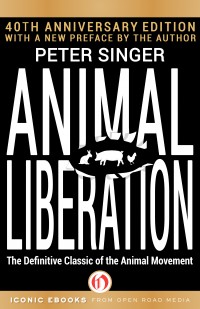by Jack Norris, RD, President of Vegan Outreach
April 14th marks the release of the 40th Anniversary ebook edition of Peter Singer’s groundbreaking work, Animal Liberation, originally published in 1975.
Animal Liberation played a critical role in inspiring a generation of animal advocates. It was instrumental for influencing the activism of a number of Vegan Outreach’s Board members, including myself. If you are at all interested in animal advocacy and have not read the book, you owe it to the animals–and yourself–to do so!
Animal Liberation is divided into six chapters:
1. All Animals Are Equal
2. Tools for Research
3. Down on the Factory Farm
4. Become a Vegetarian
5. Man’s Dominion
6. Speciesism Today
I have always thought that chapter one, All Animals Are Equal, contained the most eloquent and concise argument for extending moral consideration to animals. In reading it again for this review, my opinion hasn’t wavered. Here is an excerpt that summarizes the argument:
“If a being suffers there can be no moral justification for refusing to take that suffering into consideration. No matter what the nature of the being, the principle of equality requires that its suffering be counted equally with the like suffering—insofar as rough comparisons can be made—of any other being. If a being is not capable of suffering, or of experiencing enjoyment or happiness, there is nothing to be taken into account. So the limit of sentience is the only defensible boundary of concern for the interests of others. To mark this boundary by some other characteristic like intelligence or rationality would be to mark it in an arbitrary manner.”
Animal Liberation popularized the term speciesism. Singer writes:
“Racists violate the principle of equality by giving greater weight to the interests of members of their own race when there is a clash between their interests and the interests of those of another race. Sexists violate the principle of equality by favoring the interests of their own sex. Similarly, speciesists allow the interests of their own species to override the greater interests of members of other species. The pattern is identical in each case.”
Except for the parts cataloging the abuse of animals (Chapters 2 and 3), I find Animal Liberation to be a very enjoyable read and was glad I had a reason to reacquaint myself with it.
You can buy a copy of the re-released eBook by clicking this link:

Respect for the animals, that’s wat people need to have
Not everyone andestend es that? ?????
Infortunately